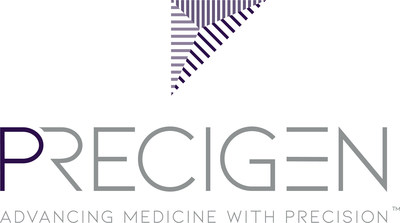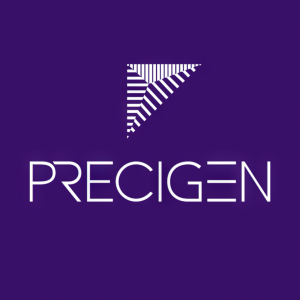Precigen Receives Orphan Drug Designation for PRGN-2012 for the Treatment of Recurrent Respiratory Papillomatosis from the European Commission
– Designation is an important step toward bringing this potentially life-changing therapy to European patients –
– EU Orphan Drug Designation is the first regulatory designation for a gorilla adenovector based immunotherapy outside of
PRGN-2012 is an innovative therapeutic vaccine with optimized antigen design that uses gorilla adenovector technology, part of Precigen's proprietary AdenoVerse™ platform, to elicit immune responses directed against cells infected with HPV 6 or HPV 11. Gorilla adenovectors have numerous advantages, including the ability for repeat administration, the inability to replicate in vivo, and the ability to deliver a large genetic payload.
Orphan Drug Designation in the European Union (EU) is granted by the EC based on a positive opinion issued by the European Medicines Agency (EMA) Committee for Orphan Medicinal Products. Medicines intended for the treatment, diagnosis or prevention of seriously debilitating or life-threatening conditions that affect fewer than five in 10,000 people in the European Union (EU) are eligible for the designation. The Orphan Drug Designation allows companies certain regulatory, financial and commercial incentives to develop medicines for rare diseases where there are no satisfactory treatment options.
"Outside of the US, our commissioned research suggests that there are more than 125,000 patients diagnosed and living with RRP, a rare and debilitating disease which currently has no approved therapeutic treatment option and is treated through repeated surgical intervention," said Helen Sabzevari, PhD, President and CEO of Precigen. "The ongoing Phase 1/2 study for PRGN-2012 in
PRGN-2012 is currently under investigation in a Phase 1/2 pivotal single-arm study in adult patients with RRP in
About RRP
RRP is a rare, difficult-to-treat and sometimes fatal neoplastic disease of the upper and lower respiratory tracts that is caused by infection with HPV 6 or HPV 11.1-4 RRP is classified based on age of onset as juvenile or adult. Currently, there is no cure for RRP and the current standard-of-care is repeated endoscopic debulking with ablation or excision of papillomatous lesions.3,4 Recurrence of papilloma after surgical removal is very common and repeated procedures are required to debulk and monitor the disease, which exposes patients to anesthetic and surgical risks, and emotional distress. RRP morbidity and mortality results from the effects of papilloma mass on the vocal cords, trachea, and lungs, which may cause voice changes, stridor, airway occlusion, loss of lung volume, and/or post-obstructive pneumonia.5 Although rare, one to three percent of RRP cases can transform into invasive squamous cell carcinoma.6,7
Precigen: Advancing Medicine with Precision™
Precigen (Nasdaq: PGEN) is a dedicated discovery and clinical stage biopharmaceutical company advancing the next generation of gene and cell therapies using precision technology to target the most urgent and intractable diseases in our core therapeutic areas of immuno-oncology, autoimmune disorders, and infectious diseases. Our technologies enable us to find innovative solutions for affordable biotherapeutics in a controlled manner. Precigen operates as an innovation engine progressing a preclinical and clinical pipeline of well-differentiated therapies toward clinical proof-of-concept and commercialization. For more information about Precigen, visit www.precigen.com or follow us on X @Precigen, LinkedIn or YouTube.
Trademarks
Precigen, AdenoVerse and Advancing Medicine with Precision are trademarks of Precigen and/or its affiliates. Other names may be trademarks of their respective owners.
Cautionary Statement Regarding Forward-Looking Statements
Some of the statements made in this press release are forward-looking statements. These forward-looking statements are based upon the Company's current expectations and projections about future events and generally relate to plans, objectives, and expectations for the development of the Company's business, including the timing and progress of preclinical studies, clinical trials, discovery programs, product candidate approval and commercialization and related milestones, the promise of the Company's portfolio of therapies, and in particular its CAR-T and AdenoVerse therapies. Although management believes that the plans and objectives reflected in or suggested by these forward-looking statements are reasonable, all forward-looking statements involve risks and uncertainties and actual future results may be materially different from the plans, objectives and expectations expressed in this press release. The Company has no obligation to provide any updates to these forward-looking statements even if its expectations change. All forward-looking statements are expressly qualified in their entirety by this cautionary statement. For further information on potential risks and uncertainties, and other important factors, any of which could cause the Company's actual results to differ from those contained in the forward-looking statements, see the section entitled "Risk Factors" in the Company's most recent Annual Report on Form 10-K and subsequent reports filed with the Securities and Exchange Commission.
Investor Contact:
Steven M. Harasym
Vice President, Investor Relations
Tel: +1 (301) 556-9850
investors@precigen.com
Media Contacts:
Donelle M. Gregory
press@precigen.com
Glenn Silver
Lazar-FINN Partners
glenn.silver@finnpartners.com
References
1 Mounts, P et al. (1982). "Viral etiology of juvenile- and adult-onset squamous papilloma of the larynx." Proc Natl Acad Sci U S A 79(17): 5425-5429.
2 Smith, E et al. (1993). "Human papillomavirus infection in papillomas and nondiseased respiratory sites of patients with recurrent respiratory papillomatosis using the polymerase chain reaction." Arch Otolaryngol Head Neck Surg 119(5): 554-557.
3 Derkay, CS et al. (2008). "Recurrent respiratory papillomatosis: a review." Laryngoscope 118(7): 1236-1247.
4 Derkay, CS et al. (2019). "Update on Recurrent Respiratory Papillomatosis." Otolaryngol Clin North Am 52(4): 669-679.
5 Seedat, RY (2020). "Juvenile-Onset Recurrent Respiratory Papillomatosis Diagnosis and Management - A Developing Country Review." Pediatric Health Med Ther 11: 39-46.
6 Dedo, HH et al. (2001). "CO(2) laser treatment in 244 patients with respiratory papillomas." Laryngoscope 111(9): 1639-1644.
7 Silver, RD et al. (2003). "Diagnosis and management of pulmonary metastasis from recurrent respiratory papillomatosis." Otolaryngol Head Neck Surg 129(6): 622-629.
![]() View original content to download multimedia:https://www.prnewswire.com/news-releases/precigen-receives-orphan-drug-designation-for-prgn-2012-for-the-treatment-of-recurrent-respiratory-papillomatosis-from-the-european-commission-302035305.html
View original content to download multimedia:https://www.prnewswire.com/news-releases/precigen-receives-orphan-drug-designation-for-prgn-2012-for-the-treatment-of-recurrent-respiratory-papillomatosis-from-the-european-commission-302035305.html
SOURCE Precigen, Inc.








